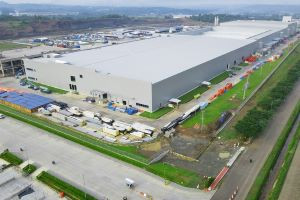Popular Reads
Top Results
Can't find what you're looking for?
View all search resultsPopular Reads
Top Results
Can't find what you're looking for?
View all search resultsAll roads taken for EV
The problem with the new regulation is that it will allow cheaper EV car imports without any clear linkage to the local production chain and human resources.
Change text size
Gift Premium Articles
to Anyone
 Ready to roll: The newly completed facility of PT HLI Green Power, the first electric vehicle (EV) battery factory in Southeast Asia, is seen in this undated photo released by Karawang New Industry City (KNIC). Located in the KNIC industrial estate in Karawang, West Java, HLI Green Power is a joint venture between South Korea’s Hyundai Motor Group and LG Energy Solution, and is slated to start production next year. (Karawang New Industry City)
Ready to roll: The newly completed facility of PT HLI Green Power, the first electric vehicle (EV) battery factory in Southeast Asia, is seen in this undated photo released by Karawang New Industry City (KNIC). Located in the KNIC industrial estate in Karawang, West Java, HLI Green Power is a joint venture between South Korea’s Hyundai Motor Group and LG Energy Solution, and is slated to start production next year. (Karawang New Industry City)
A
fter five years of efforts to become a global hub for electric vehicles (EV), this may be a good time for Indonesia to do some self-reflection.
Since President Joko “Jokowi” Widodo issued a decree on the EV acceleration program in 2019, the country has been moving down a rocky road. Possessing the world’s largest reserves of nickel, a key mineral for batteries, is not enough. With the lack of technology, skills and investment, the country must build its EV dream from scratch.
While efforts to include the country’s nickel production in the United States supply chain have hit a snag, a major push to increase processed nickel output has regrettably resulted in environmental degradation and occupational accidents in mining sites in Sulawesi and Maluku. The recent explosion at a smelter facility in Morowali, Central Sulawesi, which claimed 19 lives, is just one example of an industry beset with problems.
This is probably why the government is switching lanes by encouraging investment in car manufacturing to stimulate downstream industries and expand the domestic market.
The government recently issued another decree to amend the 2019 regulation to add new incentives for automakers to build EV manufacturing plants in the country.
In the new regulation, car manufacturers that agree to build their manufacturing facilities in Indonesia will be allowed to import fully built-up (CBU) or completely knocked down (CKD) EVs without having to pay import duties or luxury goods value-added tax (VAT) until the end of 2025.
The government has also relaxed local content requirements. The EV carmakers are given until 2026 to fulfill the minimum 40-percent domestically sourced component requirement. The new policies have gained traction. China’s BYD and Vietnam’s Vinfast have expressed interest in building factories in Indonesia.
The problem with the new regulation is that it will allow cheaper EV car imports without any clear linkage to the local production chain and human resources.
BYD Asia Pacific general manager Liu Xeuliang said that the company will build the manufacturing plant independently, without local partners, and use its own supply chain to secure production materials. The approach follows other Chinese automakers Wuling and DFSK, which also run their manufacturing facilities without local assembling partners.
The approach, which may work for the ultimate EV goals, can potentially dwarf Indonesia’s manufacturing capabilities and may eventually lead the country to new dependence on imported EV cars, including maintenance and recycling facilities.
Not all Chinese automakers take the same approach. Neta and Chery work with local partners to produce their cars in Indonesia, showing that local workers can already produce cars. Some local manufacturers have also produced electric motorcycles using their brands.
The government’s new incentives seem like a desperate effort to reach its EV dream.
The incentives came after the government’s earlier rollout of subsidies for electric car and motorcycle purchases, which have been criticized as mistargeted subsidies that went to the middle class instead of the poor.
These subsidy programs also reportedly encountered problems since not many people were attracted to them. The prices of both electric cars and motorcycles remain too high for most people, even after the subsidies.
Amid these capricious efforts to build the country’s EV ecosystem, it would be better for the government to reflect on what works and what does not, and to focus on what works. The hurdles that the government has encountered in developing the EV ecosystem were not surprises. Rome was not built in a day.
What we need to do is take lessons from the failures that are already apparent.
Environmental degradation may become irreversible, and more people will become victims if the government refuses to handle the current issues in upstream industries like nickel production.
On the downstream side, a major flow of imports may also cause environmental problems amid the absence of maintenance and good recycling facilities. And amid worsening traffic in Jakarta and other big cities, even if these EVs do not pollute, people will still bear the cost of lost time spent gridlocked.
Instead of advocating for the EV industry, it is time for the government to encourage more investment in public transportation. Indonesia, unlike its Southeast Asian peers, only has a mass rapid transit (MRT) network in Jakarta.
Even if the government wants to realize the energy transition in the transportation sector, the solution may not be EVs, but rather a green public transportation network.










